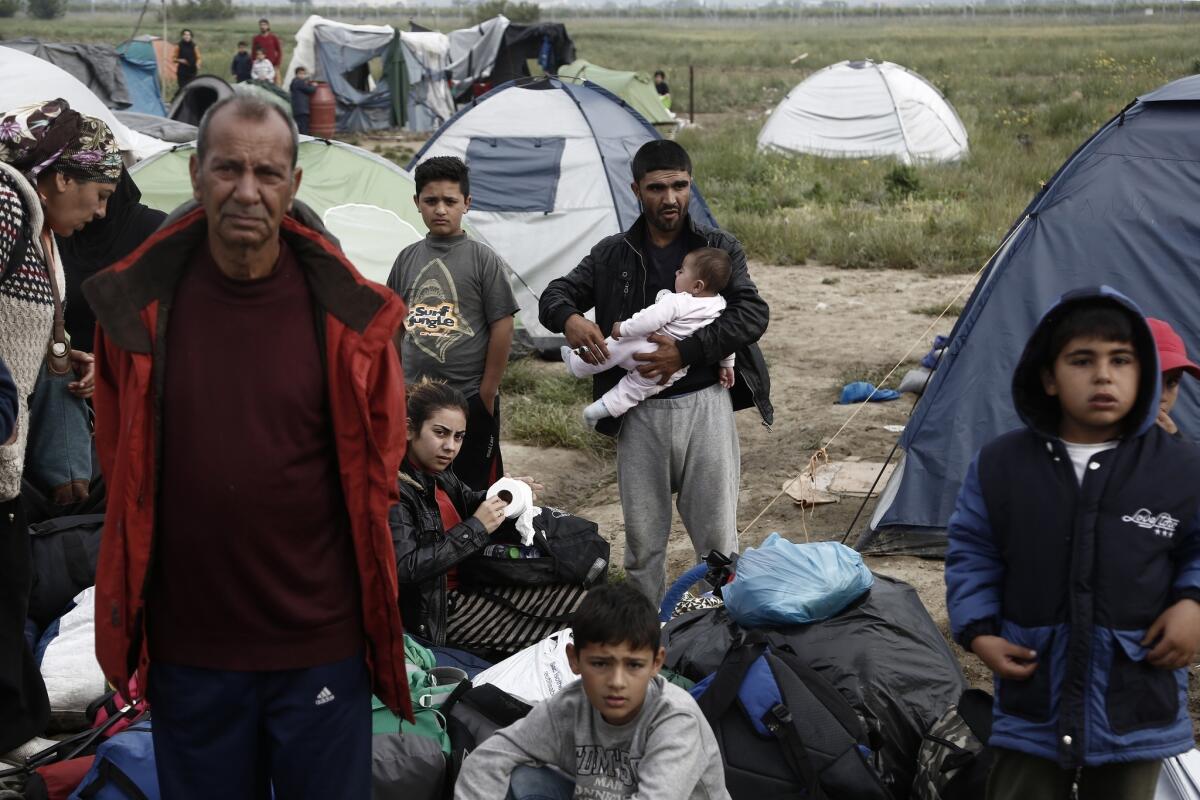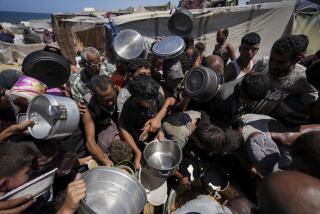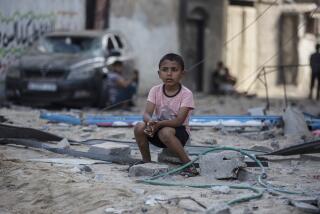Greece begins clearing thousands of refugees from border tent city in Idomeni

Reporting from Athens — Some men and boys hoisted big plastic bags filled with belongings onto their shoulders and other people picked up whatever they could carry Tuesday on their way out of Greece’s largest informal refugee camp in Idomeni.
Greek authorities began evacuating the site near the border with Macedonia, providing buses for hundreds of refugees who were being relocated to organized facilities.
About 2,000 of the more than 8,000 people at the camp were moved Tuesday, with officials saying the evacuation could last more than a week.
There were no reports of violence at the camp, which as recently as March was home to more than 14,000 people, most of them fleeing war or poverty in such places as Syria, Iraq and Afghanistan. Many people moved on from the tent city as they found other places to live.
“As long as the movement of people from Idomeni is voluntary in nature [and] we’re not seeing use of force, then we don’t have particular concerns about that,” Adrian Edwards, spokesman for the United Nations refugee agency, reportedly said in Geneva. “It often does help to move people into more organized sites.”
The Save the Children aid agency said it was concerned about the lack of services in the facilities where the refugees and migrants are being relocated.
“Authorities managing the relocation process need to take into consideration what’s in the best interest of each family or child – which is easier said than done in a process where groups of vulnerable people are being relocated en masse,” said Amy Frost, team leader for Save the Children’s response to the refugee crisis in Greece.
“Many of the children, especially lone children, have been through enough trauma already, either back home, along the journey or where they’ve been staying for weeks in transit facilities lacking basic services. Additional relocations to formal camps need to be managed sensitively to ensure the process is not adding to their trauma.”
Idomeni is a small village with a rail link leading to Macedonia and Central Europe and became the most-used crossing point for many of the million people who streamed into Greece over the last year from the Turkish coast.
But Macedonia shut its border this year, causing a humanitarian logjam at the site. The rail line has been shut for about 65 days, causing grief for transporters and exporters.
Many refugees refused to leave when the border was closed, believing the status would change back and migrants would be allowed to make their way to wealthier European countries such as Germany. But as the borders remained closed, the number of people at the camp grew.
Reports of intermittent violence among camp residents and police, including on the Macedonian side, and health, food and sanitation problems became a hallmark of life in Idomeni amid bad weather. The aid group Doctors Without Borders pulled its team of doctors and medical workers from the camp temporarily last week for security reasons.
Under the terms of a March 18 agreement between the European Union and Turkey, migrants and refugees arriving after midnight on March 20 are subject to a fast-track asylum process that will see them returned to Turkey if they are deemed to not be in need of asylum. The agreement has served as a deterrent to refugees and migrants making the sea crossing to the Greek islands, the European Union’s southeastern frontier, from the Turkish coast, with the numbers dropping from several thousands a day to about 100, officials said.
As part of the deal, the migrants and refugees in Greece before midnight on March 20 will be relocated. The agreement foresaw 6,000 relocations within a month and at least 20,000 by mid-May. Little has been done.
Greek authorities said Tuesday that the number of refugees and migrants housed on the Greek mainland and islands totaled 54,000. There were 50,000 on March 21, a day after the pact went into effect, indicating that European leaders have not resolved how to deal with the unprecedented numbers of refugees flowing into the continent and how many each nation should accept.
The Idomeni evacuations began as Turkey hosted the World Humanitarian Summit, a U.N.-backed meeting to tackle the needs of the 130 million people around the world who need aid to survive. It was attended by Greek Prime Minister Alexis Tsipras, who emphasized the burden imposed on financially strapped Greece by the refugee crisis.
“We in Greece are in the midst of a multidimensional humanitarian challenge,” Tsipras said at the summit in Istanbul. “After six years of economic crisis and harsh, unfair austerity measures, poverty and unemployment [have] risen dramatically. At the same time, Greece is on the front line of an unprecedented wave of refugees.”
Petrakis is a special correspondent.
More to Read
Sign up for Essential California
The most important California stories and recommendations in your inbox every morning.
You may occasionally receive promotional content from the Los Angeles Times.










